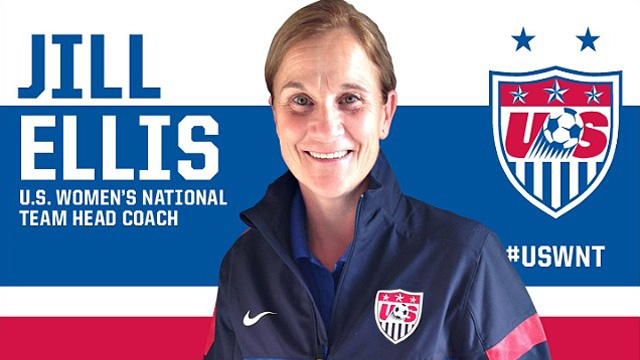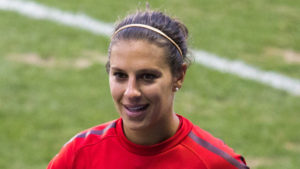Women’s World Cup: A reassessment of USWNT coach Jill Ellis, part 2

The U.S. Women’s National Team beat Japan 5-2 to win the 2015 Women’s World Cup on Sunday, after deservedly beating Germany 2-0 in the semifinal. Never mind the score, or Carli Lloyd’s 16-minute hat trick—if you had told me just told me the result a mere two weeks ago, after the WNT’s shaky 2-0 victory over a ten-player Colombia in the round of 16, I would have said you were joking.
But after reaching the last eight, the USWNT looked a whole new team in defeating China in the quarterfinal, and took it a step further by outplaying Germany in the semi, and then exploded out of the blocks to win the final against Japan. For all the criticism that many (myself very much included) have directed toward head coach Jill Ellis, the USWNT has now won its third star, and and exorcised the ghosts of 2011.
+READ: USWNT defeats Japan 5-2 to claim third Women’s World Cup title
So have we (have I) been too hard on Ellis? I think that the answer is yes, and then again no.
Let’s start with giving credit where credit is due. First and foremost, we won the World Cup. Pause to let that sink in. And it didn’t always look like it was going to happen. The U.S. played quite poorly in the group stage, and indeed in the round of 16.
But Ellis and her staff held the team together, kept the group mentality where it needed to be, and sent out a side whose performances improved as the stakes and pressure built.
The whole team seemed to play with a higher energy and intensity level in the quarterfinals – and matched it in the semi, and topped it in the wild opening 20 minutes of the final, relative to the four matches that came before.

Bringing that about is no small achievement. Ellis recognized and accepted that the existing approach wasn’t working. She then made the right lineup calls: dropping Abby Wambach to the bench, bringing in Morgan Brian.
+READ: USWNT downs Germany 2-0, advances to Women’s World Cup Final
The resulting tactical shifts – particularly having Brian and Lauren Holiday both sit deep while Lloyd was allowed the freedom to get forward – allowed the U.S. to bring more defensive pressure and (finally) achieve more balance and fluidity in possession and attack.
And Ellis selected, and has directly worked with, the forbidding Solo-Krieger-Johnston-Sauerbrunn-Klingenberg backline that was the foundation of the U.S. success in this World Cup.
As the German men’s national team showed in Brazil, and the USWNT has now shown in Canada, winning a World Cup does not require that everything be perfect from the outset, if the right adjustments are made over the course of the tournament.
 It seems inarguable that Ellis made the adjustments her side needed, and took the WNT to the summit – well beyond where almost anyone outside the team (myself very much included) thought they would go.
It seems inarguable that Ellis made the adjustments her side needed, and took the WNT to the summit – well beyond where almost anyone outside the team (myself very much included) thought they would go.
That feat deserves a whole lot of recognition and praise.
The problem for me, though, is that there’s more to the picture. In particular, almost all of the things that Ellis did right in this World Cup were merely remedying things that Ellis did wrong previously. The backline, for example, was built around the Sauerbrunn/Johnston partnership at center back.
+READ: USWNT are still playing UNC-style soccer – why not play like UVa or UCLA?
Remarkably, though, that partnership developed only in the three months prior to the World Cup – because Ellis had repeatedly spurned opportunities to try Johnston on the back line until she was forced to do so during the Algarve Cup by simultaneous injuries to Christie Rampone and Whitney Engen.

Adding Brian as a second pivot alongside Holiday seems like a tacit admission that perhaps the WNT did, indeed, need dedicated defensive midfielders – which in turn raises the old questions around why Ellis never gave a proper look to the specialist d-mids in the WNT player pool who can both break up play and distribute the ball.
It was evident that the USWNT would play better if Wambach were given limited minutes off the bench, rather than a starting spot, well before the round of 16 match against Colombia made it impossible to miss. And that’s leaving aside entirely the question whether it made sense to select Shannon Boxx and Lori Chalupny for the 23-women roster (combined World Cup minutes: 25) while omitting Crystal Dunn (currently in terrifying, NWSL-leading form with 7 goals in 11 matches).
+READ: USWNT: Crystal Dunn facing both dreams, pain on return to World Cup training camp
To be clear, I don’t raise these points merely to be churlish. My differences with the current coaching regime notwithstanding, we won the World Cup. It’s pretty hard not to be thrilled by that.
But third star or no, I do think it’s important not to lose sight of the fact that Ellis’s tenure has been marked by any number of poor coaching decisions on her part. And there are deep, longstanding issues with the program (lack of improvement in tactical sophistication at all levels, and a closed, insular player pool, to name two) that Ellis has let fester or even made worse since she took over from Tom Sermanni.
Those problems were not be banished when Christie Rampone and Abby Wambach hoisted the World Cup trophy.
 When Ellis took charge of the WNT last year, she and U.S. Soccer president Sunil Gulati made absolutely, expressly clear, that for us it was win the World Cup or bust – while standing pat. They made a bet that the WNT could eke out one last shot at a third World Cup star with the existing set of players and tactical paradigm.
When Ellis took charge of the WNT last year, she and U.S. Soccer president Sunil Gulati made absolutely, expressly clear, that for us it was win the World Cup or bust – while standing pat. They made a bet that the WNT could eke out one last shot at a third World Cup star with the existing set of players and tactical paradigm.
Well, now we’re here, and that bet ended up paying off. But tomorrow is a new day. The Olympics are only twelve months away. And in the in-between years, there will remain a great deal of work ahead for the entire USWNT program for a long time to come, if it wants to keep up with its peers in the global game.
World Cup success does not necessarily make Ellis the person to entrust with getting that work done.
SOCCERWIRE MARKETPLACE
- The St. James FC Virginia 2024-2025 Travel Tryouts
- TSJFCV - Hiring Travel Soccer Coaches
- Hiring: U13-U19 Boys Director
- Coaches Needed
- Train with professional AC Milan coach
- Loudoun Soccer 2024/25 Travel Player Placement Sessions
- Official Elite Summer Soccer Camps with Elite Pro Clubs in Europe
- Official EPL Tickets: ARSENAL, LIVERPOOL, TOTTENHAM & MORE
- Travel to Denmark for Dana Cup Hjørring 2024
- New England Surf Challenge and Showcase 2024











